|
De Litouwse schrijfster Jurga Ivanauskaitė werd geboren in Vilnius op 14 november 1961. Zie ook mijn blog van 14 november 2008 en ook mijn blog van 14 november 2009 en ook mijn blog van 14 november 2010.
Uit: The Red Dress (Vertaald door Kristina Sakalavičiūtė)
“Nora suddenly jumped up, locked the door and, throwing off the violet sweater and green skirt resolutely, grabbed the red dress and froze for an instant. Then, in a frenzy—as if someone were impatiently yelling at her to hurry—she began to dress, rushing, staggering, having difficulty getting into the sleeves. Getting into the fiery garb was not so simple, even though Nora was smaller than Elegija. The dress clung to her and outlined her body, emphasizing her breasts, pulling tight on her hips and thighs. It fell from her knees in tiny pleats, which spread on the floor like sharp tentacles. Nora looked at herself in the mirror, pulling back her black hair. It used to have a blue sheen, but now it became chestnut-colored because of the intensity of the red dress. She narrowed her eyes and smiled with satisfaction.
The inside of the dress was the opposite of its silky exterior. It was coarse and chafed her in a strange way. Nora thought it felt like a facial masque of egg whites and yeast that tightens on one's face. She began to walk around the room, a trifle dissatisfied that the dress restricted her steps. She imagined Salome floating across the stage—not shuffling like Cho-Cho-San. Fortunately, she had another costume for the dance scene.
Suddenly, somebody knocked at the door. Nora started and rushed to take off the dress. But it was so tight it seemed almost impossible to pull off—the dress kept catching on her shoulders.
"Yes, my shoulders really are broader than Elegija's," Nora uttered, wriggling, squirming and crying out. The dress did not yield.
Someone was now persistently knocking at the door.
"Hey, Nor, open the door," rang Vilija's deep voice."Stop fooling around."
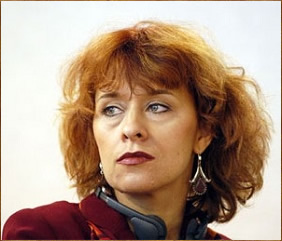
Jurga Ivanauskaitė (14 november 1961 - 17 februari 2007)
De Roemeens-Franse dichter, toneelschrijver, literair criticus, regisseur en vertaler Fondane Benjamin (eig. Benjamin Wechsler) werd geboren op 14 november 1898 in Iaşi. Zie ook alle tags voor Fondane Benjamin op dit blog.
Préface en prose (Fragment)
J'ai lu comme vous tous les journaux tous les bouquins,
et je n'ai rien compris au monde
et je n'ai rien compris à l'homme,
bien qu'il me soit souvent arrivé d'affirmer
le contraire.
Et quand la mort, la mort est venue, peut-être
ai-je prétendu savoir ce qu'elle était mais vrai,
je puis vous le dire à cette heure,
elle est entrée toute en mes yeux étonnés,
étonnés de si peu comprendre
avez-vous mieux compris que moi ?
Et pourtant, non !
je n'étais pas un homme comme vous.
Vous n'êtes pas nés sur les routes,
personne n'a jeté à l'égout vos petits
comme des chats encor sans yeux,
vous n'avez pas erré de cité en cité
traqués par les polices,
vous n'avez pas connu les désastres à l'aube,
les wagons de bestiaux
et le sanglot amer de 1'humiliation,
accusés d'un délit que vous n'avez pas fait,
d'un meurtre dont il manque encore le cadavre,
changeant de nom et de visage,
pour ne pas emporter un nom qu'on a hué
un visage qui avait servi à tout le monde
de crachoir !
Un jour viendra, sans doute, quand le poème lu
se trouvera devant vos yeux. Il ne demande
rien! Oubliez-le, oubliez-le ! Ce n'est
qu'un cri, qu'on ne peut pas mettre dans un poème
parfait, avais-je donc le temps de le finir ?
Mais quand vous foulerez ce bouquet d'orties
qui avait été moi, dans un autre siècle,
en une histoire qui vous sera périmée,
souvenez-vous seulement que j'étais innocent
et que, tout comme vous, mortels de ce jour-là,
j'avais eu, moi aussi, un visage marqué
par la colère, par la pitié et la joie,
un visage d'homme, tout simplement !
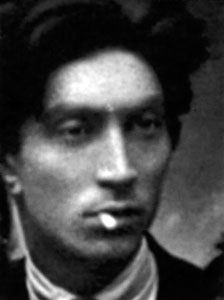
Fondane Benjamin (14 november 1898 - 2e of 03 oktober 1944)
De Engelse schrijver Eric Lawson Malpass werd geboren op 14 november 1910 in Derby. Zie ook alle tags voor Eric Malpass op dit blog en ook mijn blog van 14 november 2010.
Uit: The Return of the Moon Man
“It was cold that evening, and we were sitting by the fire, enjoying the Electric.
Grandfather was listening in; suddenly he jumps to his feet and shouts, 'Blasphemy.'
No one took much notice, for if the old man didn't jump up and shout 'Blasphemy' at least once of an evening Gran thought he was sickening and gave him a purge.
So Gran said dutifully, 'What is it, Mortimer?'
'Flying to the Moon, they are,' he cried.
'The space-ship has just left London. And they're dancing in the streets, and exploding fireworks in celebration. Sodom and ----'
But at that moment there was a noise as of a great wind passing over, and then a terrible crash as though someone had picked up all our milk chums and dropped them on the Dutch barn. We ran outside, and there, in the Ten Acre Field, a Thing was glinting in the frosty moonlight. Huge it was, like a great shining rocket.
Grandfather looked at it. 'Lost their way, maybe,' he said with malicious satisfaction.
Then he felt in his waistcoat pocket and took out a card and put it in my hand. .
'Run you, Bronwen,' he said, 'and give them the business card of Uncle Space-Ship-Repairs Jones.'
But I was frightened, being but a little girl then, and clung to my mothers skirts. So Dai, my father, started up the tractor without a word, and rode off to fetch Uncle Space-Ship-Repairs Jones.
Down to the farm came the Moon Men, as the newspapers called them, their helmets bright in the moonlight, and soon Dai my father arrived. My uncle was sitting on the tractor with him, clutching a great spanner and grinning as pleased as Punch, and soon his banging and hammering came across the still air from Ten Acre."
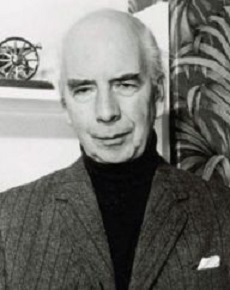
Eric Malpass (14 november 1910 - 16 oktober 1996)
De Egyptische schrijver Taha Hussein werd geboren in Al Minya in Egypte op 14 november 1889. Zie ook alle tags voor Taha Hussein op dit blog.
Uit: The Stream of Days (Vertaald door Hilary Wayment)
“When evening came El-Hagg Firuz sold his customers their supper : cheese, olives, milled sesame, or honey. To the more luxurious he supplied boxes of tunny or sardines. And to a few of them perhaps, as night approached, he sold things which have no name, and nothing to do with food, things spoken of in a whisper, yet passionately vied for.
The boy used to overhear these whisperings; sometimes he half understood, but as a rule the whole transaction was a mystery to him. As the days passed by and he grew older, he came to see through these subtle hints and ambiguities. What he learnt then obliged him to overhaul his standards of judgment, and to revise his valuation both of people and of things.
El-Hagg Firuz was a tall, jet-black fellow, and anything but talkative. But when he did speak he mumbled his words and lisped out his Arabic in a fashion which made an ineffaceable impression on the boy. He is always reminded of it by the story of Ziad and his pupil in El-Bayan wal-Tabyin. Ziad asked his pupil to say: ' 'We have been given a pony." Instead of which he repeated it so: "We have been given a bony." "Wretch!" said Ziad, annoyed. "If you can't say pony, say horse instead." Whereupon the boy replied: "We have been given an arse." Ziad, shocked, reverted to the "bony" as the lesser evil.
El-Hagg Firuz held a unique position in the neighbourhood and amongst the students especially. It was to him that they went when their money ran out towards the end of the month, or when their remittances were overdue. He it was who gave them food on credit, lent them a piastre or two from time to time, and helped them out in all kinds of emergencies. No wonder his name was as often on their lips as those of the most learned sheikhs of the Azhar.“
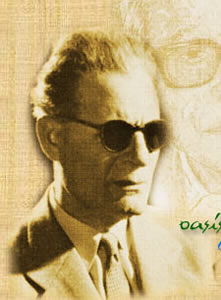
Taha Hussein (14 november 1889 – 28 oktober 1973)
De Italiaanse dichter Aleardo Aleardi werd geboren op 14 november 1812 in Verona. Zie ook alle tags voor Aleardo Aleardi op dit blog.
The Primal Histories (Fragment)
IN the deep circle of Siddim hast thou seen,
Under the shining skies of Palestine,
The sinister glitter of the Lake of Asphalt?
Those coasts, strewn thick with ashes of damnation,
Forever foe to every living thing,
Where rings the cry of the lost wandering bird
That on the shore of the perfidious sea
Athirsting dies,—that watery sepulchre
Of the five cities of iniquity,
Where even the tempest, when its clouds hang low,
Passes in silence, and the lightning dies,—
If thou hast seen them, bitterly hath been
Thy heart wrung with the misery and despair
Of that dread vision!
Yet there is on earth
A woe more desperate and miserable,—
A spectacle wherein the wrath of God
Avenges Him more terribly. It is
A vain, weak people of faint-heart old men,
That, for three hundred years of dull repose,
Has lain perpetual dreamer, folded in
The ragged purple of its ancestors,
Stretching its limbs wide in its country’s sun,
To warm them; drinking the soft airs of autumn
Forgetful, on the fields where its forefathers
Like lions fought! From overflowing hands,
Strew we with hellebore and poppies thick
The way.
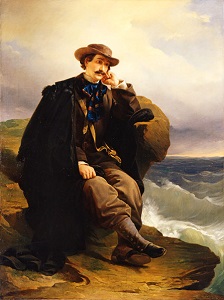
Aleardo Aleardi (14 november 1812 – 17 juli 1878)
Portret door Domenico Induno, rond 1850
De Deense dichter en schrijver Adam Gottlob Oehlenschläger werd geboren op 14 november 1779 in Vesterbro, Kopenhagen. Zie ook alle tags voor Adam Oehlenschläger op dit blog en ook mijn blog van 14 november 2009 en ook mijn blog van 14 november 2010.
Where are you now, you roses red
Where are you now, you roses red
From days of youth so blissful?
I keep your petals long since shed
In recollection’s missal.
And though each petal’s dull and grey,
Its shade like those departed,
I still recall the summer day
When crimson they all started.
In their silk weave I still can view
Each vein so finely fretted.
Once moistened by the morning dew,
Now by my tears it’s wetted.
Vertaald door John Irons
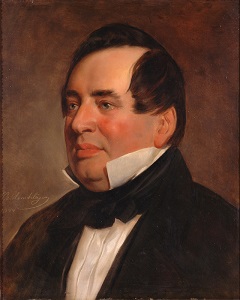
Adam Oehlenschläger (14 november 1779 – 20 januari 1850)
Portret door Friedrich von Amerling, 1844
De Oostenrijkse dichter, schrijver, essayist en vertaler Herbert Zand werd geboren op 14 november 1923 in Knoppen. Zie ook alle tags voor Herbert Zand op dit blog en ook mijn blog van 14 november 2010 en ook mijn blog van 14 november 2008.
Ich nehme Abschied
Ich nehme Abschied von
den Strohhalmen, die ich
am Wegrand aufge/esen habe,
denn ich habe nicht mehr lange zu leben,
und auch das Stroh nicht,
von Menschenhand geschnittener Ha/m,
der Birnbaum und der Brunnen vorm Bauernhaus,
die Katzen nicht, die von Mähmaschinen zerfetzt
auf den Feldern liegen,
die Spinnen, die in den alten Scheunen verdorren
in Mittagsg/ut, die alten Holzrechen
in versiegenden Flüssen,
der Roggengeruch in verfallenden Mühlen.
Ich bin nur gekommen, um alles dies nochmals zu sehn,
davon zu sprechen auch, da doch niemand mehr spricht
vom Schönen wie vom Schrecklichen
und etwas Neues anhebt in unseren Köpfen,
das aber Welten freisetzt
von Bildern, die gebunden waren,
verborgen in Winkeln. Jetzt, da es nicht mehr
festgehalten wird in schwieligen Händen,
nicht mehr verdeckt von den Füssen, die darauf
standen, jetzt wird vieles sichtbar werden,
aber schnell auch vergehn, wenn niemand
es festhält.
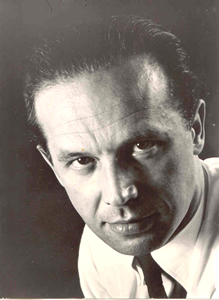
Herbert Zand (14 november 1923 – 14 juli 1970)
De Zwitserse schrijver Jakob Schaffner werd geboren op 14 november 1875 in Basel. Zie ook alle tags voor Jakob Schaffner op dit blog en ook mijn blog van 14 november 2010 en mijn blog van 14 november 2008.
Uit: Johannes, Roman einer Jugend
„In diesem Moment verehrte ich auch ihn tief und voll unaussprechlichen Verständnisses. Ich sah ihm nach, bis er hinter Büschen und Bäumen verschwunden war; dann dachte ich an die Mutter, die ich im Haus wußte, und ich hatte die Regung, mit diesem Gefühl zu ihr zu gehen; doch gehorchte ich ihm nicht, sondern setzte meinen einsamen Umgang ganz im Geist des Vaters durch den zerstörten Garten fort. Damals mochte ich etwa drei Jahre alt sein.
Meine Mutter »sah« ich auf diese Weise zum erstenmal, als sie vor dem Haus auf dem Pflaster kniete und mit einem alten Messer das Unkraut zwischen den Steinen heraus jätete. Sie hatte eine blaue Schürze an; die Sonne schien ihr auf den schwarzen Scheitel, und ich wußte, daß sie ihre Arbeit ungern tat und unmutig war; sie hatte vorher einen Wortwechsel darum mit dem Vater gehabt. Meine sozusagen moralischen Dimensionen waren bisher einfach Länge und Breite gewesen – die Eltern und ich –; der kleine Auftritt nahm darin die erste Teilung vor, spaltete das Elternpaar in Vater und Mutter – Länge und Tiefe –, durch welche letztere mir der Blick in die dritte Dimension von Gut und Böse eröffnet wurde, der mir das Sein zum Dasein machte. Ich begriff ahnungsweise unter der frühesten Beunruhigung, deren ich mich erinnere, daß es auch wegstrebende und selbst widerstrebende Richtungen im Leben gibt, und die Mutter sah ich fortan unweigerlich in diesem Verhältnis. Das mag manchen wundern, aber auch das ist Begabung, und außerdem wird nach dem ersten Erlebnis dieser Art immer wieder etwas geschehen sein, was mich daran erinnerte und mich in dieser Anschauung bestärkte.
Eine sehr frühe Erinnerung sind die Sperlinge, die im Obergeschoß unseres Häuschens nisteten, einem Heuboden, der nach außen mit Holz verschlagen und sehr angenehm rot gestrichen war; in den Zwischenräumen zwischen den Brettern, die man für die Atmung des Heus gelassen hatte, hingen lebendig und unordentlich die Nester dieser Zigeunerbande an den Tag heraus.“
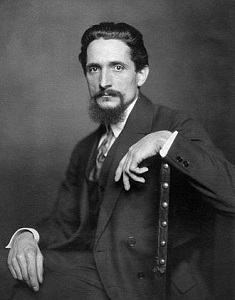
Jakob Schaffner (14 november 1875 – 25 september 1944)
Rond 1920
|



